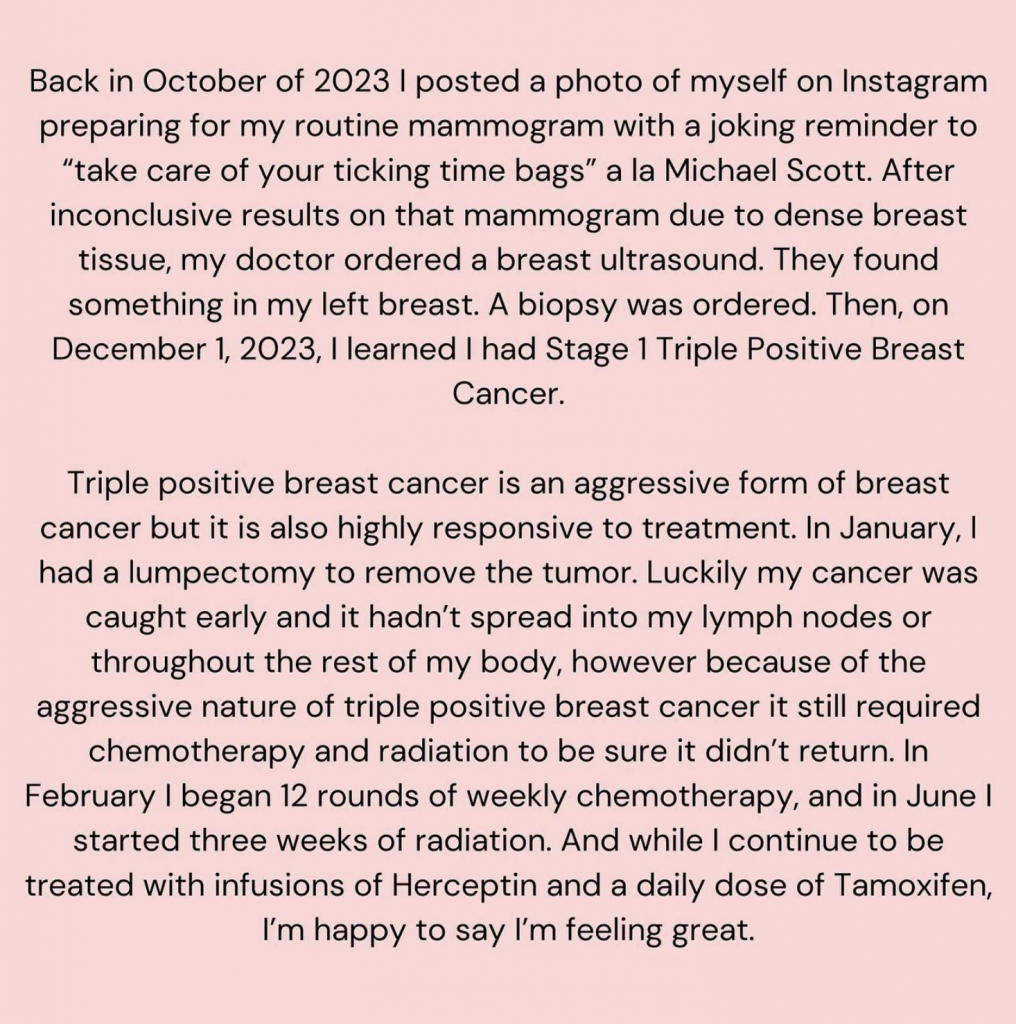Sharing Her Breast Cancer Journey
- Actress Jenna Fischer, most known for her role as Pam on NBC’s long-running show The Office starring Steve Carell and John Krasinski, has just disclosed that she went through breast cancer. She is now in remission after getting diagnosed last December.
- After a cancer diagnosis, many are open to sharing their experiences as much as they can, while others prefer to keep it to themselves or close loved ones. SurvivorNet experts say both approaches, and everything in between, are valid.
- The medical community has a consensus that women between 45 and 54 have annual mammograms. However, the U.S. Preventive Services Task Force (USPSTF) says that women should start getting mammograms every other year at the age of 40, suggesting that this lowered age for breast cancer screening could save 19% more lives.
- For women with a family history of breast cancer, doctors say earlier screening is advisable in conjunction with counseling from your physician
Currently living in Los Angeles, the Indiana native, 50, disclosed her health update Tuesday on Instagram.
Read More
View this post on Instagram
“A big thank you to [former co-star from The Office] Angela Kinsey’s husband Josh Snyder for taking this photo. It’s just one example of the care they showed me during this journey,” she added.
Commended for Her Courage
Applauding her decision to share her new “C Club” status, droves of fans and famous followers commended her for her courage.
“You already know how much I love you and how incredibly proud of you I am,” wrote fellow actress and pal Olivia Munn, who is also a breast cancer survivor. “But I just want to say it again; I love you and by sharing your story you’re helping so many women and saving so many lives. You’re just the best.”
RELATED: Remarkably, Actress Olivia Munn, 43, Discovers Aggressive Breast Cancer Despite ‘Normal’ Mammogram
Katie Couric, another breast cancer survivor and longtime cancer advocate, also cheered Fischer on for deciding to go public with her diagnosis. “Jenna! Thank you for sharing this and so happy you’re doing well.”
“Congratulations, @msjennafischer !! I’m so grateful to know you’re on the other side and cancer free!” chimed in Jennifer Garner.
On the subsequent photo slides, Fisher went deeper into her story, mentioning her October 2023 mammogram prep: “Take care of your ticking time bombs,” she had joked “à la Michael Scott,” meaning a line from Steve Carell’s lovingly and awkwardly-inappropriate character from The Office.

Because of that checkup, Fischer thankfully caught the disease early, with no lymph node involvement, and underwent a lumpectomy, which means surgery to only remove the cancer tumor and remnants of disease.
Raising Awareness
She said she decided to making the announcement “for two reasons.”
“One, I’m ready to ditch the wigs. Two, to implore you to get your annual mammograms.”

“I’m also sharing in hopes that it will be a source of support to any woman who is going through this right now,” Fischer continued. “As anyone who has had a cancer diagnosis knows, your life changes immediately. It becomes all about doctor’s appointments, test results, treatments and recovering from treatments. Suddenly everything in your life is geared around one thing: fighting cancer.”
After sharing what her home life was like with her 10 and 13-year-old, sometimes going to bed before her kids and having to take naps, she thanked her “village” that helped with them in her and her family’s time of need.

Concluding her post, Fischer wrote: “Again, don’t skip your mammogram. Take it from Pam and her Pam Pams,” she joked of her “secretary” character from The Office. “Michael was right. Get ’em checked ladies.”
What Is Triple-Positive Breast Cancer?
Triple-positive breast cancer is a type of breast cancer where the tumor cells have estrogen receptors, progesterone receptors and a larger than normal number of HER2 receptors on their surface, typically referred to as ER-positive, PR-positive and HER2-positive.
When faced with a breast cancer diagnosis, it’s important to know if you have any one of these receptors because it can alter your specific course of treatment.
Triple-positive breast cancer is treated with hormone drugs along with drugs that target HER2.
Managing Chemotherapy Side Effects
Chemotherapy is an effective tool for oncologists to help treat or manage cancer by stopping cancerous cells from growing, dividing, and spreading to other organs. Chemo works by traveling through the bloodstream, killing cancerous cells. However, healthy cells are also impacted in the process, leading to side effects.
Patients almost universally experience fatigue, often alongside gastrointestinal side effects, such as nausea. Doctors have many effective medications to combat chemo-induced nausea. “But mitigating that fatigue often depends on the patient,” Dr. Renata Urban, a gynecologic oncologist at the University of Washington in Seattle, previously told SurvivorNet.
“Neuropathy is probably one of the most challenging side effects,” added Dr. Urban. Neuropathy results from damage to the peripheral nerves. It usually resolves after chemotherapy treatment, but sometimes symptoms can persist.
While it’s typically characterized by numbness or a pins-and-needles sensation in the hands and feet, neuropathy can have several different symptoms, including:
- Weakness in the hands or feet
- Stabbing or burning pain in the hands or feet
- Difficulty gripping, such as when holding a fork
- Difficulty with fine motor skills, such as writing or buttoning a shirt
- Nausea and vomiting are common side effects of chemotherapy. When chemotherapy affects the rapidly dividing cells in the lining of the stomach, the resulting cellular havoc in the gastrointestinal tract can lead to these side effects.
Doctors can help patients mitigate these symptoms with various medications before, during, and after treatment.
“Part of the chemotherapy prescription includes a set regimen of anti-nausea medications,” Dr. Urban explained. “We also ensure that patients have medications at home that they can use should they develop nausea after treatment.”
Hair Loss
Hair loss is another side effect of chemotherapy. It usually begins about three to four weeks after chemotherapy and continues throughout treatment. It happens because this treatment targets quickly dividing cells throughout the body.
“For cancer patients, losing one’s hair can be unbelievably stressful. To start with, the dread of losing one’s hair can lead to some sleepless nights and feelings of anxiety,” Dr. Samantha Boardman, a New York-based psychiatrist and author, told SurvivorNet.
Coping with hair loss
Most patients can expect regrowth four to six weeks after treatment. However, it is possible when your hair grows back, you may notice some changes in its color and texture.
Deciding to Share a Cancer Diagnosis
After a cancer diagnosis, many are open to sharing their experiences as much as they can, while others prefer to keep it to themselves or close loved ones. SurvivorNet experts say both approaches, and everything in between, are valid.
“Patients who have just been diagnosed with cancer sometimes wonder how they are going to handle the diagnosis of the cancer in social situations,” psychiatrist Dr. Lori Plutchik previously explained to SurvivorNet.
Should I disclose my cancer diagnosis?
Questions like, “How much information should I share and with whom should I share the information?” are things Plutchik says patients will often wonder. “There is no one right way to handle this diagnosis. People should do what feels right to them.”
A cancer journey can last from just a few months to years to a lifetime, which means patients may be experiencing a lot of uncertainty until they fully understand where their health stands. This uncertainty can influence when someone is ready to share their diagnosis, Dr. Plutchik noted.
Dr. Plutchik also stressed that those close to a person going through cancer should be respectful of their wishes when it comes to disclosing their diagnosis and seeking support.
Many Parents Going Through Cancer Find Strength in Their Children
Hoy referenced his young children for sharing his diagnosis. Sometimes, children offer parent patients moral support while battling cancer directly or indirectly. We often hear parents say things like, “I’m going to beat this for my children.”
Facing cancer as a parent can be incredibly daunting. Fearful thoughts about leaving your children may creep into your mind and add even more to your overflowing plate.
“No matter what your prognosis is, it’s essential to talk openly and honestly with kids,” said Laura Nathan-Garner, Director of Strategic Communications at MD Anderson Cancer Center.
RELATED: Telling Your Kids You Have Cancer: ‘When it Comes to Your Kids, You Want to Protect Them’
“Cancer patients with children can have increased motivation to endure difficult treatment but may also be concerned about the emotional impact of the illness on their offspring,” Dr. Cindy Moore of Massachusetts General Hospital Cancer Center explained to The ASCO Post, an oncology newspaper.
Dr. Moore said those with children should discuss their most significant concerns with their healthcare teams so an effective communication plan can be created.
When Should I Start Getting Mammograms?
The medical community has a consensus that women between 45 and 54 have annual mammograms.
However, an independent panel of experts called the U.S. Preventive Services Task Force (USPSTF) says that women should start getting mammograms every other year at the age of 40, suggesting that this lowered age for breast cancer screening could save 19% more lives.
For women with a family history of breast cancer, doctors say earlier screening is advisable in conjunction with counseling from your physician
Learn more about SurvivorNet's rigorous medical review process.

